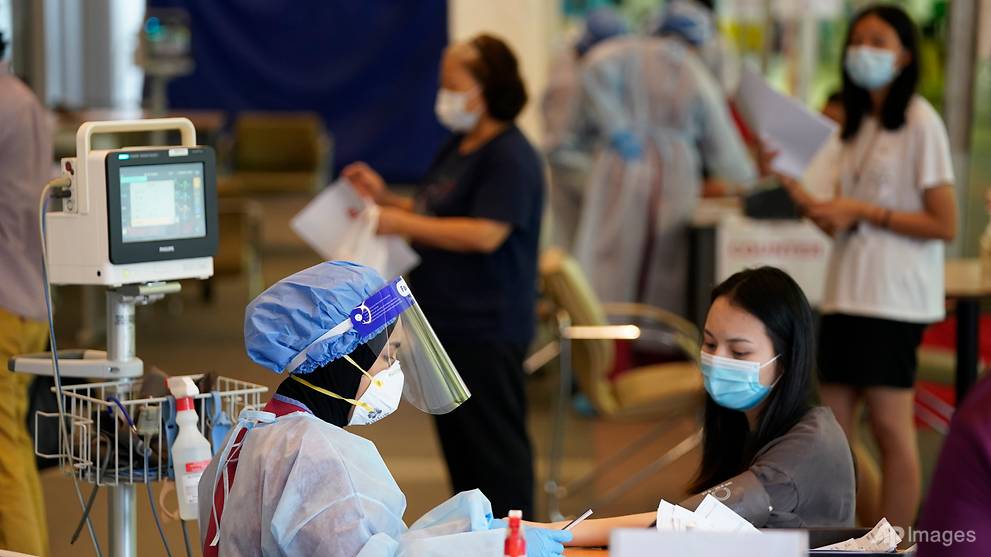WASHINGTON: President Donald Trump ventures out of Washington on Saturday for his first political appearance since his election defeat to Joe Biden, campaigning in Georgia where two run-off races will decide the fate of the US Senate.
The president takes the stage at 7pm in the southern city of Valdosta, exactly one month before special Jan 5 elections.
It is just under a month since he was declared the loser in the presidential race.
Yet at a time when most defeated presidents would be working to burnish their legacy, Trump - who has yet to concede to Biden - has barely left the White House, sending out a stream of angry tweets challenging the result and demanding that Republicans nationwide defend him.
Biden won in Georgia by just under 12,000 votes. That result, while narrow, has been confirmed by subsequent recounts, making all the more surprising a phone call Saturday from Trump to Georgia Governor Brian Kemp reportedly urging him to press state legislators to overturn the result.
The stakes in the run-off elections are sky-high. Former president Barack Obama laid them out at a virtual rally on Friday, saying that "the special election in Georgia is going to determine ultimately the course of the Biden presidency."
If Democratic challengers Raphael Warnock and Jon Ossoff defeat Republican senators Kelly Loeffler and David Perdue, the Senate will be evenly divided at 50-50, meaning Democratic Vice President Kamala Harris would cast any deciding votes, as the Constitution dictates.
The race has drawn enormous attention. One measure of the intense interest: With donations pouring in from across the country, the candidates have already spent more than US$315 million, the AdImpact website reported, an astounding figure for senatorial races.
And figures as prominent as Obama, Vice President Mike Pence and now Trump himself are scrambling to boost voter turnout.
MIXED MESSAGING
But Trump has placed himself in a difficult spot. Since Biden won the Nov 3 election, the president has repeatedly, and baselessly, attacked the US electoral system as riddled with "fraud."
Despite an overwhelming series of setbacks in the courts, the president and his lawyers have advanced wild conspiracy theories (one involving long-dead Venezuelan president Hugo Chavez) to explain Biden's victory.
Now analysts say he might have created a political monster - having undercut Georgia voters' faith in the election system just as he needs them to turn out on Jan 5.
A headline in the Valdosta Daily Times summed up the conflicted feeling among area voters: "Trump in Valdosta: S.Ga. excited, outraged by presidential visit."
VIRUS RECORD
Part of the "outrage" stems from the notion of yet another mass Trump rally coming on a day when the banner headline in the Atlanta Journal Constitution reads: "State sets single-day virus record."
Masks will be required and temperatures taken at the airport rally, local media reported, though public health officials say such mass gatherings always carry risk.
Trump's ability to excite his supporters remains powerful, and he thrives on the campaign rally setting.
But some voters even in long conservative Georgia are expressing weariness over the constant drama surrounding the president.
Analysts said it could make a crucial difference whether Trump, in Valdosta, merely repeats his litany of election grievances or instead addresses the importance of maintaining Senate control.
"It will be good for the rally if it's about Perdue and Kelley Loeffler and how we need to go vote," Spud Bowen, a Republican businessman from Tifton, Georgia, told the Valdosta Daily Times, "but I am certainly not in the mood to hear any more name-calling."
THIN LINE
Loeffler and Perdue have moved cautiously, urging Georgians to vote without directly challenging Trump's angry complaints.
But Trump has not made things easier for Georgia Republicans, angrily attacking officials in his own party over his loss there, starting with Governor Brian Kemp.
"I'm ashamed that I endorsed him," Trump said of Kemp, furious that the governor did not denounce Republican secretary of state Brad Raffensperger - branded an "enemy of the state" by the president - for certifying the election.
The president phoned Kemp early Saturday in what the Washington Post called a "brazen effort" to interfere in the long-settled election.
The Post said Kemp, once a devoted Trump ally, had refused the entreaty. His office confirmed the call, the Post said, if not its contents.
Kemp's office said earlier he would not attend the rally Saturday, after a young Loeffler staff member and close family friend of Kemp's, Harrison Deal, died in a car crash Friday.
For the 74-year-old Trump, who is considering a fresh White House run in 2024, the Georgia rally represents a gamble.
His performance there could boost his political chances, said conservative commentator Marc Thiessen.
But "if he lets Democrats take back the Senate because he was focused on rooting out some mythical communist conspiracy to steal the 2020 election, he will go down in ignominy," Thiessen wrote in The Washington Post
https://news.google.com/__i/rss/rd/articles/CBMicmh0dHBzOi8vd3d3LmNoYW5uZWxuZXdzYXNpYS5jb20vbmV3cy93b3JsZC90cnVtcC10by1hcHBlYXItaW4tZ2VvcmdpYS1pbi1nYW1ibGUtb3Zlci1jb250cm9sLW9mLXVzLXNlbmF0ZS0xMzcwODQ1MtIBAA?oc=5
2020-12-05 22:15:31Z
52781215821036





